Adam Peaty: Why experts call GB's Rio Olympic champion the alpha male of swimming
- Published
Olympic Games on the BBC |
|---|
Hosts: Rio de Janeiro Dates: 5-21 August Rio time: BST -4 |
Coverage: Watch on BBC One, BBC Two, BBC Four, Red Button and up to 24 HD video streams on mobile, desktop, connected TVs and app, plus follow on Radio 5 live and via live text commentary. |
Close? He may as well have been swimming on his own.
Adam Peaty's 100m breaststroke gold on Sunday night was one of the great displays in British Olympic history: a victory margin of more than a second and a half, domination in an event supposed to be decided by centimetres.
Even his celebration produced an iconic image to carry down the years as he roared his pleasure astride a red lane marker with arms thrust out wide and face raised to the rafters.
A first Olympic swimming gold for a British male since Adrian Moorhouse in 1988. A world record in his heat and another in the final. This is how 21-year-old Peaty has come from Uttoxeter to conquer the world.
Stroke of genius
In Sunday's final, Peaty led at 50 metres and pulled away down the second length to leave the rest of the field in his foaming wake. Even in swimming a time that no man has ever clocked before, never did he look rushed, never did he appear to tighten.
"It's the smoothness of Peaty's action that defines him," says four-time Olympian Karen Pickering.
"The timing of his arms and legs is so good - the perfect stroke sees them working together, with the leg-kick driving the arms forward, not interfering with the last part of the pull.
From fear of water to world champion - meet Adam Peaty
"If you bring your legs up too soon you can feel the glide part of your stroke cut short, but you also don't want your glide to be so long that you start to stall, that you start to slow down.
"Adam's technique is better than any of his rivals'. Some of that comes with practice, some from drills. You have to work on it in the pool to optimise it. A coach can see it and help you, but you can also feel it as a swimmer.
"The great ones understand the sensations and understand when the timing is working.
"Then there is the rhythm of his stroke. He's so quick. Quite a few of the 100m swimmers have that; the longer distance swimmers tend to glide for longer.
"But what Adam can do is maintain that rhythm, and maintain the damage it does. Some of his rivals will tie up in the last 30 or 40 metres, rhythm dropping off, while others will lose its effect. You can see them start to go up and down in the water a little more rather than firing all that momentum forwards."
The alpha male
Peaty is a man who wears his passions openly. He said in the build-up to these Olympics that he does it for Queen and country. He also loves to listen to controversial Compton hip-hop heroes NWA.
That may make him the first Olympic champion to be inspired by both Elizabeth II and Eazy-E. But here in Rio he has combined an almost regal bearing with an aggression in the pool that his storied rivals have been unable to match.
"You never know how athletes will react at their first Olympic Games," says Mark Foster, who carried the British team's flag at the opening ceremony of the 2008 Games in Beijing.
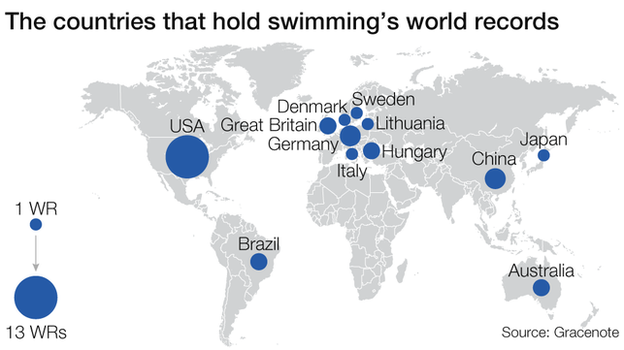
"All of us from minority sports grow up dreaming of an Olympics. It's the be-all of your professional life: get to the Games, then win a medal. It doesn't matter how successful you've been at your World Championships or continental meets - the Olympics is so much bigger, in terms of crowds, attention, pressure and atmosphere.
"The beauty with Adam is that he not only says it's just another couple of swims, but he performs like that too. It's very easy telling yourself that you're going to treat the Olympics like that, yet quite another to act that way.
"Adam swims as he says. A couple of lengths at the Commonwealths in Glasgow, a couple at the Worlds in Kazan last year, a couple here in Rio.
"When it comes to a big final you can be destroyed by the little things in your head. The what ifs, the wondering, that little bit of fear, of what your rivals night do or what you might do wrong.
"Obsessing over the small details when you're at the training pool is the right thing to do. The purity of Adam's gift is that when it comes to that critical moment, he doesn't overthink it. He stays in the moment: I'm here, I'm ready, let's go.
"He has a wonderful awareness of what that does to his rivals. In fact he has the full ABC - awareness, belief, commitment.
"It's such a powerful tool for him in the defining race - leading by example, talking of the legacy he wants to leave, making it quite clear to the others that he is the alpha male."
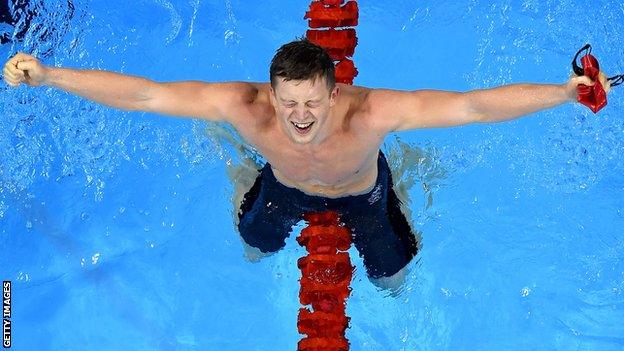
Peaty treats his races as "just another couple of lengths", says Mark Foster - but he celebrated his gold medal and world record with gusto afterwards
Physical prowess
At the peak of his winter workload, Peaty will be training so hard that he must eat up to 8,000 calories a day - more than three times the recommended amount for an average male.
His most brutal sessions - repeated 50-metre sprints off such short recoveries that he is at his maximum heart-rate for every length - are so punishing that he says he is "practically in a coffin" by the end of a week. It pays a rich dividend.
"There is more symmetry with Adrian Moorhouse," says Pickering, in Rio as an expert summariser for BBC Radio 5 Live.
"Adrian, in his day, was physically bigger than his rivals. He had that real triangular shape to his upper body.
"Breaststroke swimmers over the decade gradually caught up. But Adam has that same physical gap. He has the big chest, the big lungs, the explosive strength. He's out on his own.
"There is natural strength there, but Adam also works on that on the gym, taking a genetic gift and adding everything he can to it.
"There's a video he's posted on his Instagram account of him doing a jumping press-up. Not just a hand-clap press-up, when you're in the air long enough to bring your palms together under your chest, but with feet up too, and his body in a perfectly straight line."
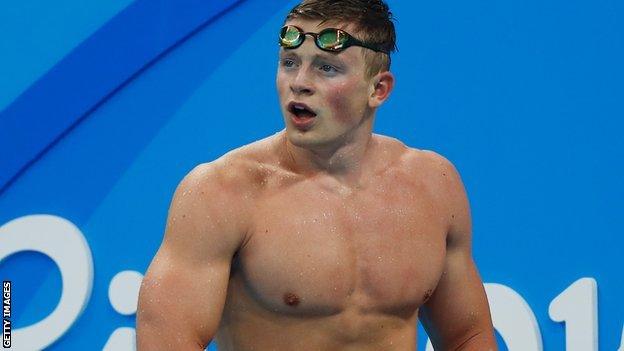
"Adam has that same physical gap [that Adrian Moorhouse had]," says Pickering. "He has the big chest, the big lungs, the explosive strength. He's out on his own"
Getting out hard
Peaty has been coached since the age of 12 by Mel Marshall, an Olympian eight years ago and named international swim coach of the year in 2014 for her work with her young charge.
Marshall knows instinctively on which days to leave Peaty alone and on which, in his own words, "to make me angry enough to get the session done". She has also pushed hard at his few flaws.
"He has improved since his world titles and world records a year ago," says Foster. "Now he can control the race all the way through.
"His one weakness in the past has been his start. He can still do it better, but he's taken care of it. He knew in his semi-final here that he could have a bad swim, a full second off his best, and still win.
"It means his rivals know they can't get him back. At the Worlds, 2012 Olympic champion Cameron van der Burgh had half a body length lead off the start and got that out to three-quarters of a body length. It didn't matter. Peaty still came through to win.
"He stood on the blocks on Sunday night and knew he was going to win. I've had that feeling, and it's a wonderful sensation. What I never had was the knowledge that I was so significantly faster than my rivals that they probably couldn't get within a second of me."
Slowing down slowest
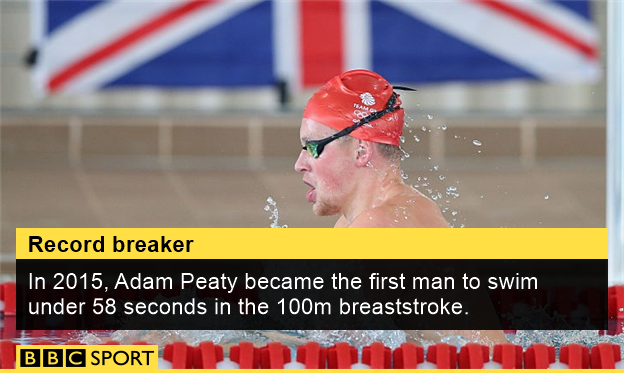
Peaty may not have enjoyed the most promising of starts to his swimming career. He was famously scared of water as a young child, refusing to even sit down in the bath. But if the beginnings were uncertain, his finishes are unmatched.
"He has such a good back end of the race in the 100m," says Pickering. "He's world record holder over 50m, but because he can swim the 200m so well too, he has the endurance to hold that pace together from blocks to wall.
"It sounds counterintuitive, but the swimmer who wins a big final isn't the one with the fastest speed. It's the one who tires the least, the one who can maintain his pace as that of their rivals drops away.
"You saw that in his first-round heat here in Rio, when he smashed his own world record. He went out so fast, but there was no sign of him tying up. The others just can't match him."
They may not be able to match him for many years to come.
"In breaststroke swimming, the only person touching that world record of his for the next 10 years is himself," says Foster.
"When I broke the world record in 2001, I always thought I would go faster - yet until my retirement in 2008 I never did. Adam will. I'm certain of it."
- Published8 August 2016
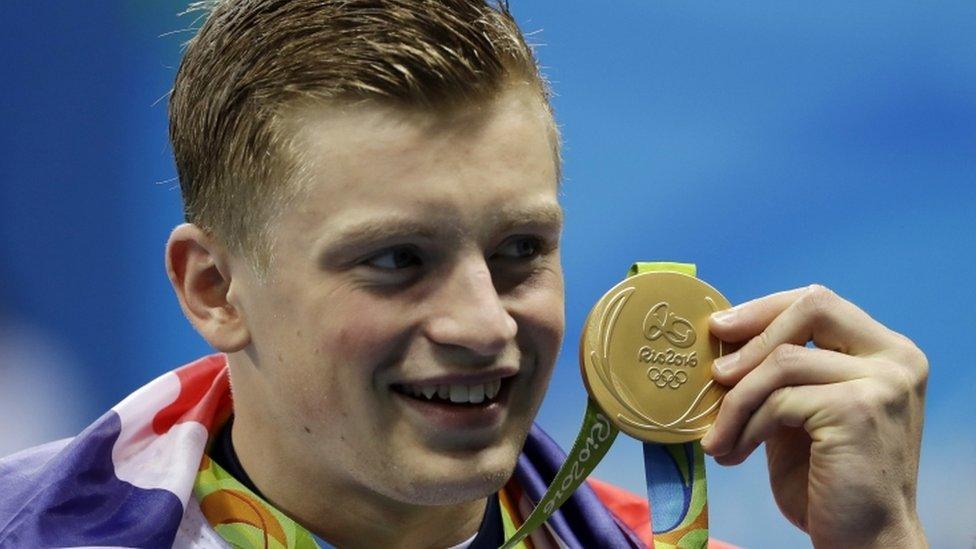
- Published8 August 2016
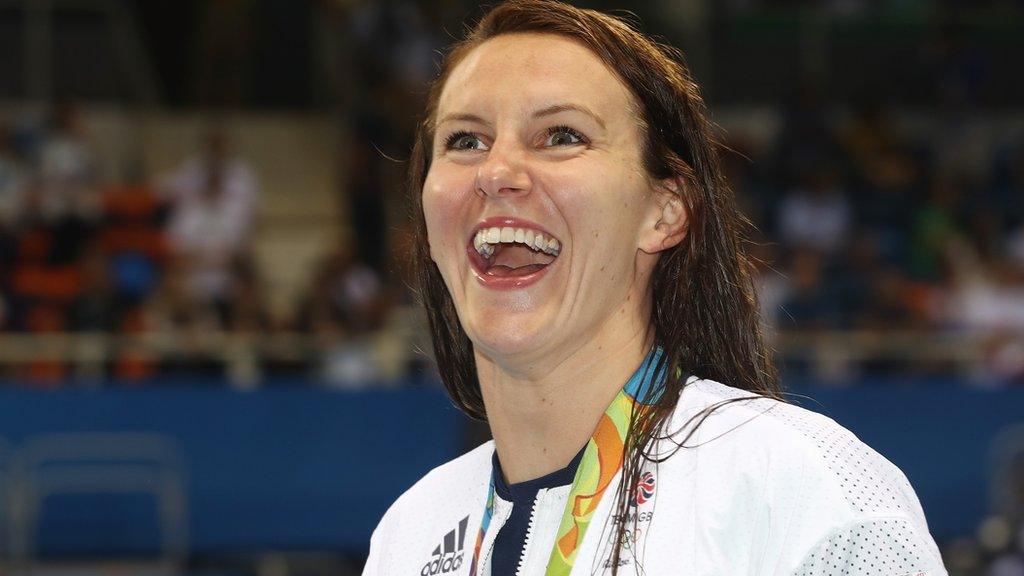
- Published18 August 2016

- Published3 August 2016

- Published19 July 2016
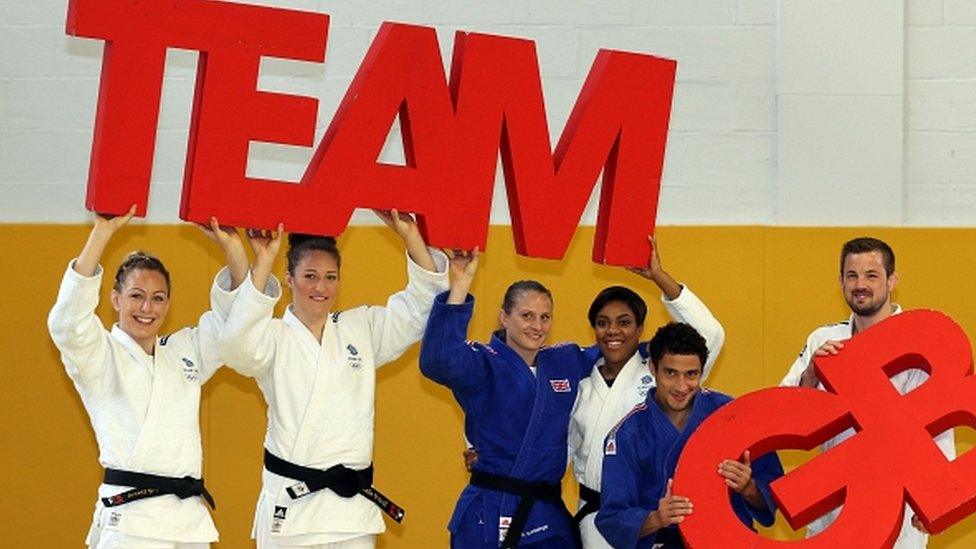
- Published3 August 2016
